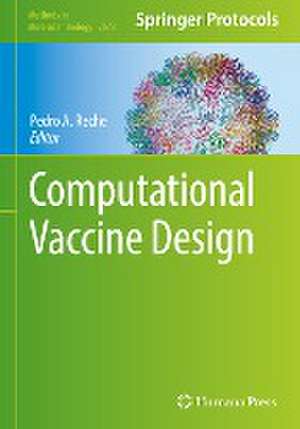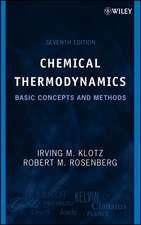Computational Vaccine Design: Methods in Molecular Biology, cartea 2673
Editat de Pedro A. Recheen Limba Engleză Hardback – 2 iun 2023
Authoritative and cutting-edge, Computational Vaccine Design: Methods and Protocols aims to reflect on the rigorous and imaginative use of computational technologies to help catalyze future efforts and to improve global public health through the development of a broad range of novel vaccines.
Din seria Methods in Molecular Biology
- 9%
 Preț: 791.59 lei
Preț: 791.59 lei - 23%
 Preț: 598.56 lei
Preț: 598.56 lei - 20%
 Preț: 882.95 lei
Preț: 882.95 lei -
 Preț: 252.04 lei
Preț: 252.04 lei - 5%
 Preț: 802.69 lei
Preț: 802.69 lei - 5%
 Preț: 729.61 lei
Preț: 729.61 lei - 5%
 Preț: 731.43 lei
Preț: 731.43 lei - 5%
 Preț: 741.30 lei
Preț: 741.30 lei - 5%
 Preț: 747.16 lei
Preț: 747.16 lei - 15%
 Preț: 663.45 lei
Preț: 663.45 lei - 18%
 Preț: 1025.34 lei
Preț: 1025.34 lei - 5%
 Preț: 734.57 lei
Preț: 734.57 lei - 18%
 Preț: 914.20 lei
Preț: 914.20 lei - 15%
 Preț: 664.61 lei
Preț: 664.61 lei - 15%
 Preț: 654.12 lei
Preț: 654.12 lei - 18%
 Preț: 1414.74 lei
Preț: 1414.74 lei - 5%
 Preț: 742.60 lei
Preț: 742.60 lei - 20%
 Preț: 821.63 lei
Preț: 821.63 lei - 18%
 Preț: 972.30 lei
Preț: 972.30 lei - 15%
 Preț: 660.49 lei
Preț: 660.49 lei - 5%
 Preț: 738.41 lei
Preț: 738.41 lei - 18%
 Preț: 984.92 lei
Preț: 984.92 lei - 5%
 Preț: 733.29 lei
Preț: 733.29 lei -
 Preț: 392.58 lei
Preț: 392.58 lei - 5%
 Preț: 746.26 lei
Preț: 746.26 lei - 18%
 Preț: 962.66 lei
Preț: 962.66 lei - 23%
 Preț: 860.21 lei
Preț: 860.21 lei - 15%
 Preț: 652.64 lei
Preț: 652.64 lei - 5%
 Preț: 1055.50 lei
Preț: 1055.50 lei - 23%
 Preț: 883.85 lei
Preț: 883.85 lei - 19%
 Preț: 491.88 lei
Preț: 491.88 lei - 5%
 Preț: 1038.84 lei
Preț: 1038.84 lei - 5%
 Preț: 524.15 lei
Preț: 524.15 lei - 18%
 Preț: 2122.34 lei
Preț: 2122.34 lei - 5%
 Preț: 1299.23 lei
Preț: 1299.23 lei - 5%
 Preț: 1339.10 lei
Preț: 1339.10 lei - 18%
 Preț: 1390.26 lei
Preț: 1390.26 lei - 18%
 Preț: 1395.63 lei
Preț: 1395.63 lei - 18%
 Preț: 1129.65 lei
Preț: 1129.65 lei - 18%
 Preț: 1408.26 lei
Preț: 1408.26 lei - 18%
 Preț: 1124.92 lei
Preț: 1124.92 lei - 18%
 Preț: 966.27 lei
Preț: 966.27 lei - 5%
 Preț: 1299.99 lei
Preț: 1299.99 lei - 5%
 Preț: 1108.51 lei
Preț: 1108.51 lei - 5%
 Preț: 983.72 lei
Preț: 983.72 lei - 5%
 Preț: 728.16 lei
Preț: 728.16 lei - 18%
 Preț: 1118.62 lei
Preț: 1118.62 lei - 18%
 Preț: 955.25 lei
Preț: 955.25 lei - 5%
 Preț: 1035.60 lei
Preț: 1035.60 lei - 18%
 Preț: 1400.35 lei
Preț: 1400.35 lei
Preț: 1405.27 lei
Preț vechi: 1713.74 lei
-18% Nou
Puncte Express: 2108
Preț estimativ în valută:
268.93€ • 277.82$ • 223.82£
268.93€ • 277.82$ • 223.82£
Carte tipărită la comandă
Livrare economică 25 martie-08 aprilie
Preluare comenzi: 021 569.72.76
Specificații
ISBN-13: 9781071632383
ISBN-10: 1071632388
Ilustrații: XVI, 519 p. 1 illus.
Dimensiuni: 178 x 254 mm
Greutate: 1.14 kg
Ediția:2023
Editura: Springer Us
Colecția Humana
Seria Methods in Molecular Biology
Locul publicării:New York, NY, United States
ISBN-10: 1071632388
Ilustrații: XVI, 519 p. 1 illus.
Dimensiuni: 178 x 254 mm
Greutate: 1.14 kg
Ediția:2023
Editura: Springer Us
Colecția Humana
Seria Methods in Molecular Biology
Locul publicării:New York, NY, United States
Cuprins
Vaccine Design: an introduction.- Epitope binning of monoclonal and polyclonal antibodies by biolayer interferometry.- Clustering and annotation of T-cell receptor repertoires.- Protocol for Classification Single Cell PBMC Types from Pathological Samples using Supervised Machine Learning.- Unbiased, high-throughput identification of T cell epitopes by ELISPOT.- CD4+ T cell epitope identification from complex parasite antigen mixtures.- Computational grafting of epitopes.- Manufacture of Mesoporous Silicon Microparticles (MSMPs) as adjuvants for vaccine delivery.- IEDB and CEDAR: Two Sibling Databases to Serve the Global Scientific Community.- Updates on databases of allergens and allergen-epitopes.- TSNAD and TSNAdb: The useful toolkit and database for clinical application of tumor-specific neoantigens.- EPIPOX: A Resource facilitating epitope-vaccine design against human Pathogenic Orthopoxviruses.- Prediction of linear B cell epitopes in proteins.- Design of linear B-cell epitopes and evaluation of their antigenicity, allergenicity, and toxicity: an immunoinformatics approach.- NetCleave: an open-source algorithm for predicting C-terminal antigen processing for MHC-I and MHC-II.- Prediction of TAP transport of peptides with variable length using TAPREG.- Docking-based Prediction of Peptide Binding to MHC Proteins.- The PANDORA software for anchor-restrained peptide:MHC modelling.- Prediction of Peptide and TCR CDR3 Loops in Formation of Class I MHC-Peptide-TCR Complexes using Molecular Models with Solvation.- Prediction of Bacterial Immunogenicity by Machine Learning Methods.- Vaxi-DL: an artificial Intelligence enabled platform for vaccine development.- A web-based method for the identification of IL6 based immunotoxicity in vaccine candidates.- In silico tool for identification, designing and searching of IL13 inducing peptides in antigens.- A leanReverse Vaccinology pipeline with publicly available bioinformatic tools.- Immunoinformatics protocol to design multi-epitope subunit vaccines.- In-silico Structure-based Vaccine Design.- Reverse vaccinology for influenza A virus: from genome sequencing to vaccine design.- Immunoinformatics vaccine design for Zika virus.- Immunoinformatics approaches in designing vaccines against COVID-19.- A Sample Guideline for Reverse Vaccinology Approach for the Development of Subunit Vaccine using Varicella Zoster as a Model Disease.- Computational Vaccine Design for Poxviridae Family Viruses.- Computational prediction of Trypanosoma cruzi epitopes towards the generation of an epitope-based vaccine against Chagas disease.- Computational vaccine design for common allergens
Textul de pe ultima copertă
This volume explores computational vaccine design and the technologies that support it. Chapters have been divided into four parts detailing immunonics and system immunology, databases, prediction of antigenicity and immunogenicity, and computational vaccinology. Written in the format of the highly successful Methods in Molecular Biology series, each chapter includes an introduction to the topic, lists necessary materials and reagents, includes tips on troubleshooting and known pitfalls, and step-by-step, readily reproducible protocols.
Authoritative and cutting-edge, Computational Vaccine Design aims to reflect on the rigorous and imaginative use of computational technologies to help catalyze future efforts and to improve global public health through the development of a broad range of novel vaccines.
Caracteristici
Includes cutting-edge methods and protocols Provides step-by-step detail essential for reproducible results Contains key notes and implementation advice from the experts















